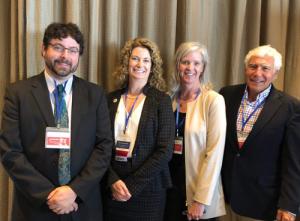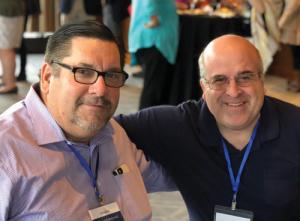NASUCA Mid-Year Meeting
Elin Swanson Katz is president of the National Association of State Utility Consumer Advocates, known as NASUCA, and the Consumer Counsel for the State of Connecticut.
Hey, Electric Sector, give me a minute, will ya? There's someone here I'd like you to meet. I've been trying to get the two of you in a room together for years.

Electric Sector, meet Muni Broadband. Well, the full name is Municipal Broadband Projects to Deploy Fiber Optic Cable and Provide High-Speed, Low-Cost Broadband Internet Services to Retail Consumers, Including Through Public-Private Partnerships, but for short, our friend and colleague, "Muni Broadband."
As you know, Electric Sector, with your visions and plans for Smart Cities, Smart Communities, Smart Grid, Smart Homes, Smart Meters, and the Internet of Things, you would like to see all kinds of internet-connected devices throughout the communities that you serve, as well as on the poles, at substations, along transmission lines, and at other key points.
Those devices and others yet to be discovered will collect data, lots of it, and in preparation you need to focus on the demands and opportunities presented by that data. For instance, how will you move, store, manage, protect, and perhaps most important, provide mutual value and benefits to your company and customers from all of that data?
Even if you're relying on Wi-Fi enabled or other wireless devices, your easiest and most productive avenue to providing these services will be accomplished by over-lashing fiber optic cable (fiber) to your existing wire infrastructure for connectivity and to backhaul data to your operations center. Which means that you will need fiber everywhere, which will in turn place you in the profitable position of providing high-speed broadband services throughout your network.
 CT Consumer Counsel Office’s Staff: Joseph Rosenthal, Principal Attorney, and Richard Sobolewski, Supervisor of Utility Financial Analysis.
CT Consumer Counsel Office’s Staff: Joseph Rosenthal, Principal Attorney, and Richard Sobolewski, Supervisor of Utility Financial Analysis.
Like yourself, Electric Sector, Muni Broadband has a very similar need for community-wide internet access. Broadband has become an essential service, almost as important to many as electricity. Just ask your kids.
At the same time, there are millions of residents and businesses across the United States without adequate access to affordable broadband services, a critical problem known as the Digital Divide. This need is especially acute in rural areas and low-income minority urban centers.
Because of this demand for an essential service, cities and towns across the country are developing or investigating municipal broadband networks. One of the most common ways is through a public-private partnership, under which the network is built and operated (and sometimes financed or owned) by a private third party, including by municipal electric companies or cooperatives.
I know what you're going to say: what about the private sector, what about the cable and phone companies? Well, these are rural communities and low-income neighborhoods that are unserved or underserved by the private sector, often despite years of effort to get those companies to build out or upgrade their systems in these areas.
These private sector companies typically have business plans that don't include many of these areas, since they focus on short-term profits more than societal needs. So, we see mayors, first selectmen, chief information officers, economic development chairs, and other municipal officials responding to consumer demands, recognizing that they can no longer wait for the cable and phone companies.
They are recognizing that they must take steps, often in concert with the private sector through public-private partnerships, to provide this essential service to their residents, businesses, and community anchor institutions. We even see this in areas that may have a single provider, often cable, offering fast services, but where residents and businesses desperately want a choice or a less expensive option.
If this sounds familiar to you, Electric Sector, that's because the municipally-owned side of your body developed in this way. Early in the last century, we saw mayors, first selectmen, and other municipal officials develop municipal networks to provide their citizens with another essential service - electricity, in the absence of private sector business plans to supply electricity to them.
So, today's leaders that are working on muni networks display the same kind of gumption that we saw from leaders in the 1900s, who helped revolutionize the electric industry and our country in general. Now, almost all Americans have electricity. A hundred years ago, that wasn't even close to a reality.
So, here's why I thought you two should meet. You both will benefit from ubiquitous affordable high-speed broadband to satisfy the great demand in the market for this service. Wouldn't it be helpful to the Electric Sector to partner with these thoughtful, gumption-filled municipal leaders and solve this problem of uneven access to broadband together?
Perhaps the Electric Sector could build out networks that allow for some sharing of capacity, providing "open access" to the fiber network that could be universally productive, a win-win for all. Maybe one party can help the other finance and operate a communitywide network.
Maybe there are opportunities for co-locating infrastructure, with one party over-lashing on the other party's fiber or wires and competitive internet service providers riding on the public-private partnership network.
I'm sure you will have other ideas. And it's not the first time this has come up. We've seen rural electric co-ops and municipal companies innovating to build fiber networks in unserved and underserved areas.
What doesn't make sense, at least to me, is to have the Electric Sector and Muni Networks duplicating what are typically very capital intensive (read "expensive") projects. I think you can make a lot of progress if you work together.
So, I'll leave you two to talk. Let me know if I can be of assistance. Before I go, have you seen Gas Sector or Water Sector around here anywhere? I want them to meet Muni Broadband as well.
Lead image: Municipal Broadband Panel: Christopher Mitchel Director, Community Broadband Networks, Institute for Local Self-Reliance; Elin Swanson Katz, Connecticut Consumer Counsel, NASUCA President; Danna MacKenzie, Executive Director, Minnesota Office of Broadband Development; Bill Levis, Pro Bono Attorney, AARP Colorado


